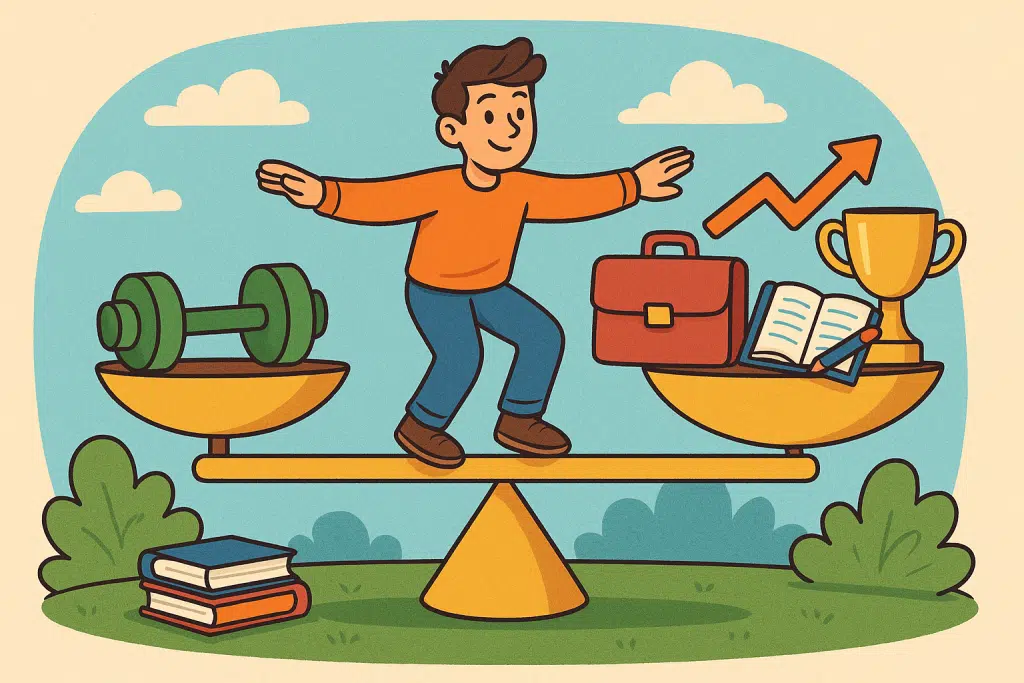Why A Balanced Life Creates More Opportunities for Success
Isabella Lewis August 7, 2025
In a world obsessed with hustle culture and productivity hacks, the idea of living a balanced life can feel like a luxury only the rich or retired can afford. But recent trends—and a growing mountain of research—suggest otherwise. In fact, people who create balance between work, home, focus, and rest often find themselves stumbling into more opportunities, not fewer.

Why is this topic trending right now?
The rise of hybrid work, the backlash against burnout, and Gen Z’s demand for mental health protections have pushed the idea of “balance” from woo-woo wellness blogs into boardrooms, academic journals, and even investment portfolios. According to Deloitte’s 2023 Gen Z and Millennial Survey, over 46% of Gen Zs and 39% of millennials say they’ve made career choices based on work-life balance, even over salary. Companies, leaders, and career-driven individuals are starting to pay attention.
The Truth: Balance Isn’t Laziness—It’s Strategy
Let’s address the elephant in the room: people often equate balance with laziness. If you’re not constantly grinding, are you really serious about success? But that mindset is outdated, harmful, and frankly, bad for business.
A balanced life isn’t about doing less—it’s about doing what matters more efficiently, intentionally, and sustainably.
Here’s how a balanced life actually gives you an edge:
- Better Decision-Making: Chronic stress reduces your ability to think clearly and make rational choices. A study from the American Psychological Association confirms that stress negatively impacts memory, concentration, and logical reasoning.
- More Creative Breakthroughs: Ever notice how your best ideas show up in the shower or on a walk? Balance creates mental space for creative thinking, which is fuel for innovation.
- Increased Energy and Motivation: When you’re rested, nourished, and fulfilled in your personal life, you show up more motivated at work. That energy is magnetic—people want to work with and promote folks who aren’t running on fumes.
- Deeper Relationships = Bigger Networks: Personal and professional relationships are the lifeblood of success. Balance allows time for nurturing meaningful connections, which often open doors.
Real-Life Example: The Founder Who Took Breaks and Built a Multi-Million Dollar Company
Greg McKeown, author of Essentialism, once shared a story about a Silicon Valley CEO who began prioritizing sleep, family dinners, and hobbies before making big business decisions. Result? Higher productivity, more decisive leadership, and a company that hit 100M US dollars valuation in two years. Coincidence? Not likely.
The New Equation: Breaks + Focus + Home Life = Productive Career
A productive career doesn’t start with longer hours. It starts with building a life that can sustain you through career highs and lows. This shift is backed by hard data:
- Harvard Business Review published a 2021 study revealing that workers who took regular breaks during the day were 50% more productive than those who worked straight through.
- The World Health Organization (WHO) labeled burnout as an occupational phenomenon in 2019, citing its direct link to chronic work-related stress without proper recovery time.
A balanced life creates:
- Mental clarity to focus on what truly matters
- Time to reflect, recharge, and course-correct
- Space to cultivate creativity and strategy, not just execution
The Components of a Balanced Life (And How to Create Yours)
Let’s get practical. What does a balanced life look like, and how can you create one without quitting your job or going full hermit?
1. Breaks That Actually Work
Not all breaks are created equal. Scrolling through TikTok on your lunch break? Might feel relaxing, but it doesn’t truly give your brain a breather.
Smart Break Tips:
- Take a 15-minute walk outside with no phone.
- Use the Pomodoro method (25 minutes work, 5-minute break).
- Try non-sleep deep rest (NSDR) techniques or short guided meditations.
- Schedule social breaks to talk with someone who makes you laugh or feel heard.
Pro Tip: Add breaks to your calendar. Treat them like meetings with your future focused self.
2. Home Life That Fuels You
You don’t need a Pinterest-perfect home. But your environment and relationships outside work deeply influence your success inside work.
Here’s how to build a home life that supports you:
- Create tech-free zones or hours.
- Prioritize sleep (aim for 7-8 hours minimum).
- Practice gratitude with your family or roommate at dinner.
- Set boundaries for when “work ends” (this is huge for remote workers).
The more regulated your nervous system is at home, the more resilient you’ll be in high-stakes work moments.
3. Laser-Focused Work Sessions
Focus is a currency. And distractions are like inflation—they make your effort worth less.
To get more done in less time:
- Use time blocking to guard deep work windows.
- Work in sprints. Avoid multitasking like it’s malware.
- Identify your peak productivity hours and structure your biggest tasks then.
Harvard neuroscientist Dr. Andrew Huberman has popularized the idea of “ultradian rhythms” (roughly 90-minute focus cycles). Tap into that and you’ll double your output with half the stress.
4. Clarity About What Matters
Balance doesn’t mean equal time for everything. It means knowing what deserves your full attention right now.
How to get clarity:
- Journal for 5 minutes each morning: “What matters today?”
- Rank tasks by importance not urgency.
- Have a weekly “CEO check-in” with yourself (even if you’re not a CEO).
When You Don’t Create Balance, Life Forces It On You
Let’s not sugarcoat this: ignoring balance eventually leads to burnout, breakdown, or a brutal wake-up call.
Whether it’s a health scare, strained relationships, or career burnout—your body, mind, and spirit will demand balance at some point.
Why not build it now, on your own terms?
Tools and Trends Making It Easier to Build Balance
Good news: technology is finally catching up to the need for sustainable success.
Here are a few trending tools helping people achieve balance:
- Notion & Sunsama: For daily planning and visual time blocking
- Rise Science: Sleep science app used by top athletes to maximize rest
- Calm or Headspace: For structured meditation and stress relief
- Smartwatches with HRV tracking: Monitor stress and recovery
Also, the 4-day workweek movement is gaining traction globally. Trials in the UK, Japan, and New Zealand showed massive boosts in productivity and well-being. Balance is no longer a luxury; it’s becoming a policy shift.
But What If I Have Kids, Debt, a Demanding Job, or All of the Above?
Balance doesn’t mean your life is always calm or equally divided. It means you’re aware of your limits, and you’re making micro-decisions to protect your energy and values.
Start small:
- Say no to one extra task this week.
- Ask for a 30-minute buffer between meetings.
- Get 15 minutes of sun. It helps more than you think.
Final Thought: Balance Isn’t a Destination. It’s a Skill.
You don’t achieve balance like a goal you tick off a list. You practice it daily. Sometimes you’ll get it right. Sometimes you’ll overshoot. But with intention and consistency, it becomes your default.
And that’s when the opportunities start to show up—not because you’re chasing them, but because you’re finally positioned to receive them.
References
- Harvard Business Review. (2023). Why Work-Life Balance Is Essential for Career Growth. https://hbr.org/
- Forbes. (2024). How Finding Balance in Life Leads to Greater Long-Term Success.https://www.forbes.com/
- Psychology Today. (2023). The Science Behind Work-Life Balance and How It Impacts Achievement.https://www.psychologytoday.com







